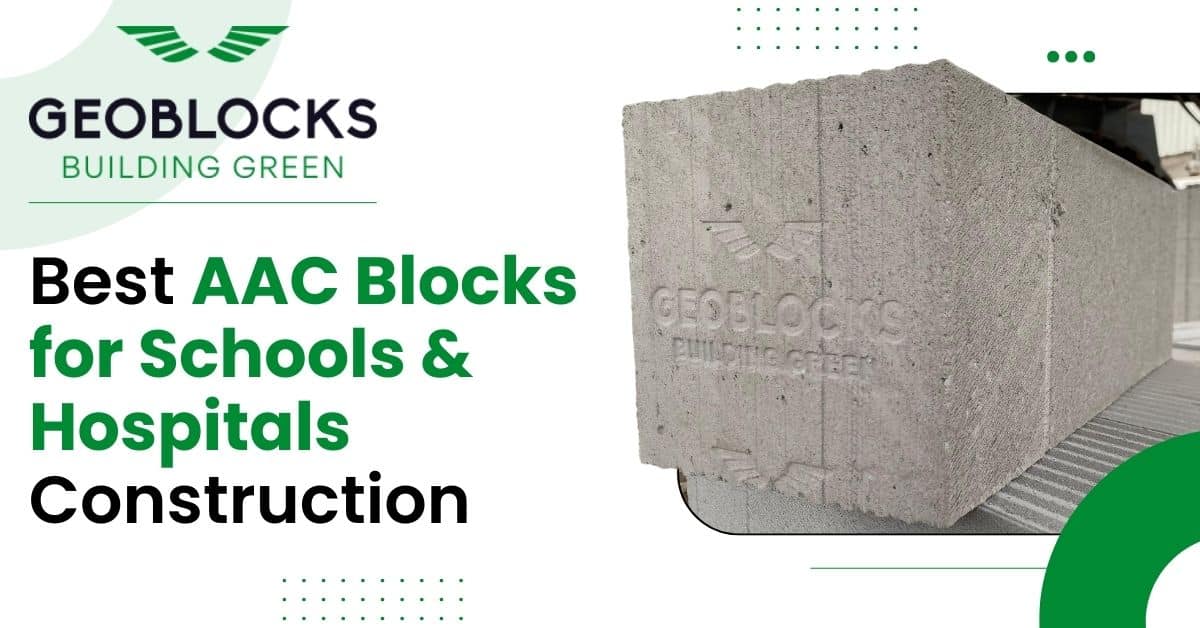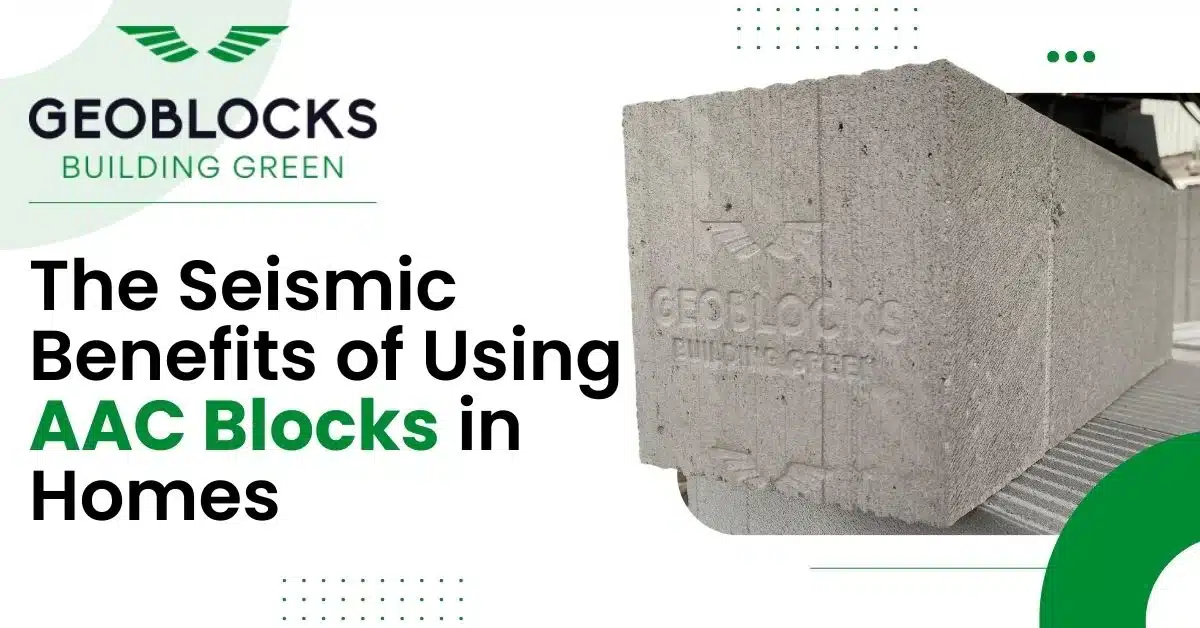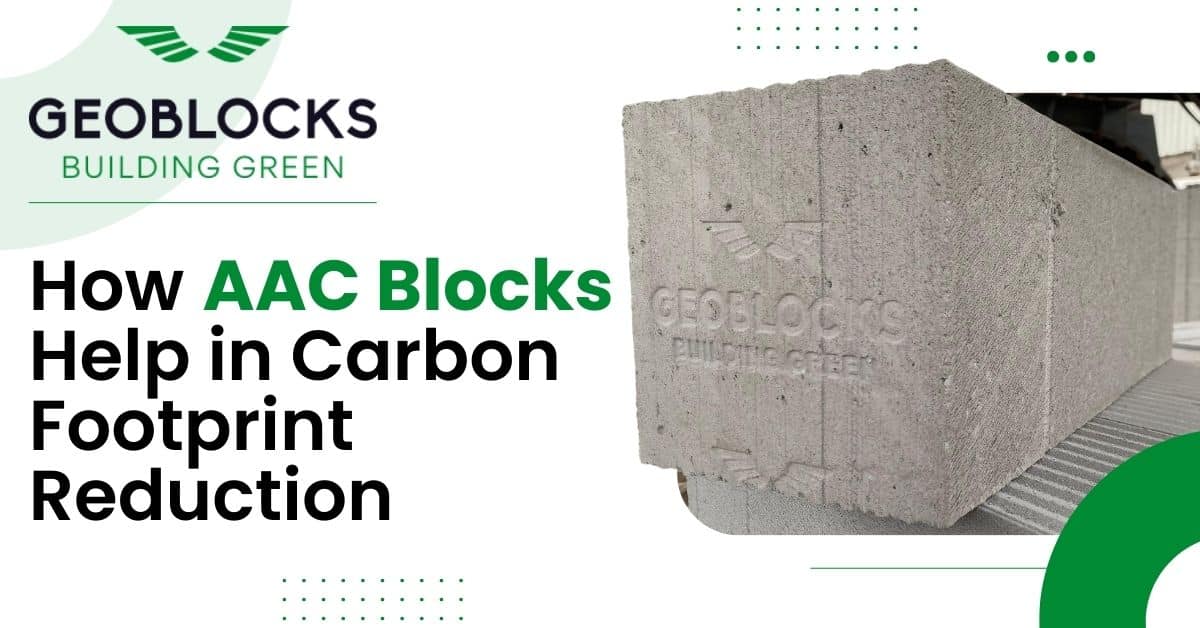When constructing schools and hospitals, choosing the right building materials is crucial for safety, durability,…
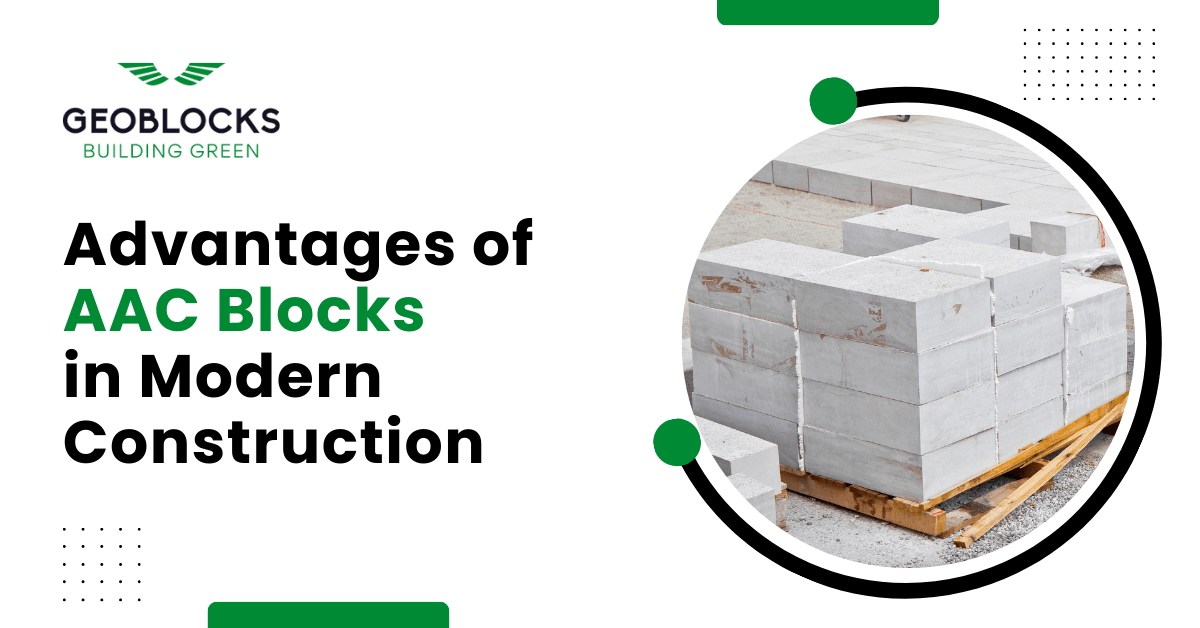
In the ever-evolving landscape of Modern Construction, the demand for Innovative Building Materials that offer both Efficiency and Sustainability has never been higher. As a Trusted Name in the Industry, Geoblocks understands the importance of staying ahead of the curve by embracing cutting-edge solutions that redefine the way buildings are designed and constructed. One such solution that is making waves in the industry is AAC Blocks.
Geoblocks, a leading Building Blocks Manufacturer in Vadodara and Construction Materials Supplier in Vadodara recognizes AAC Blocks’ transformative potential in shaping the Future of Construction. Today, we’ll delve into the numerous advantages of AAC blocks and why they are rapidly becoming the preferred choice for architects, engineers, and contractors alike.
From their Lightweight Composition to their Exceptional Thermal Insulation Properties and Superior Resistance to Fire and Moisture, AAC Blocks offer many Advantages that Traditional Building Materials Can’t Match. Moreover, their Eco-Friendly Nature and Long-Term Durability make them an attractive option for Environmentally Conscious Projects seeking to minimize their Carbon Footprint.
Explore the Unparalleled Advantages of AAC Blocks and Uncover How They Are Revolutionizing Modern Construction Practices. Whether you’re a Seasoned Industry Professional or an Aspiring Builder looking to stay ahead of the curve, this Guide will Equip you with the Knowledge and Insights you need to Harness the Full Potential of AAC Blocks in your Next Construction Project.
What are AAC Blocks?
AAC (Autoclaved Aerated Concrete) Blocks are innovative Building Materials that have gained widespread recognition in the Construction Industry for their exceptional Properties and Versatile Applications. Made from a Blend of Sand, Cement, Lime, and Aluminium Powder, AAC Blocks undergo a Unique Manufacturing Process that involves Autoclaving, which involves Curing the Blocks in a High-Pressure, Steam-Filled Chamber.
The result is a Lightweight yet Durable Building Material that boasts a Cellular Structure with Millions of Tiny Air Pockets. This Distinctive Composition gives AAC Blocks several Advantageous Characteristics, making them Ideal for a Wide Range of Construction Projects.
AAC Blocks come in Various Sizes and Thicknesses to accommodate different building requirements, offering Flexibility and Customization options for Architects, Builders, and Developers. Their Uniform Dimensions and Precise Edges ensure Easy Installation and Efficient Use of Materials, leading to Cost Savings and Streamlined Construction Processes.
Advantages of AAC Blocks
AAC (Autoclaved Aerated Concrete) Blocks offer a Multitude of Advantages that set them apart as a Preferred Choice for Modern Construction Projects. Let’s Explore the Key Advantages that make AAC Blocks a Game-Changer in the Construction Industry:
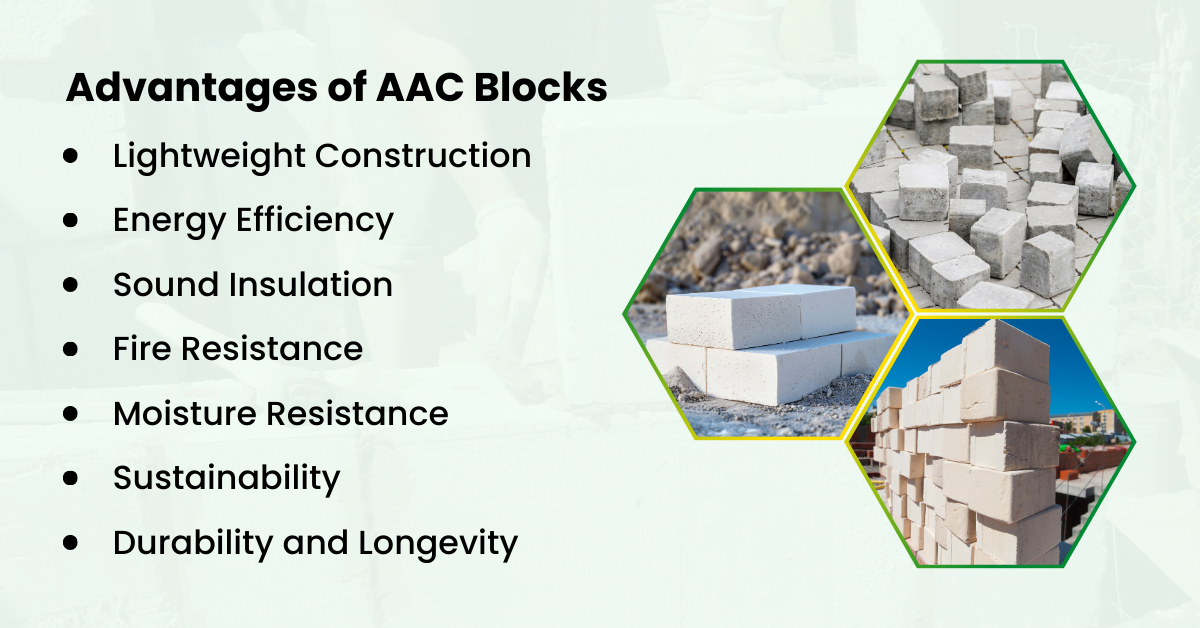
Lightweight Construction
AAC Blocks are known for their Lightweight Nature, offering Numerous Advantages for Construction Projects of all scales. Let’s Explore How AAC Blocks facilitate Lightweight Construction and the Advantages they bring to the Table:
Reduced Structural Load
AAC Blocks are significantly lighter than traditional building materials such as Clay Bricks or Concrete Blocks. This inherent lightweight nature reduces the overall structural load on buildings, minimizing the need for heavy-duty foundations and support structures. As a result, Builders can optimize structural designs and achieve cost savings on materials and construction labor.
Ease of Handling
Handling and Transporting Heavy Building Materials can be a logistical challenge on construction sites. However, AAC Blocks alleviate these concerns with their lightweight composition, making them Easy to Lift, Carry, and Maneuver during Installation. Builders can streamline construction processes and improve efficiency by working with AAC Blocks that are easier to handle than conventional materials.
Faster Construction Timelines
The lightweight nature of AAC Blocks enables faster construction timelines, as builders can work more quickly and efficiently without being hindered by heavy materials. With AAC Blocks, construction projects can progress at an accelerated pace, leading to reduced labor costs and earlier project completion. Whether it’s residential, commercial, or industrial construction, AAC Blocks facilitates Swift and Seamless Construction Processes.
Versatile Applications
Despite their lightweight composition, AAC Blocks offer impressive Structural Strength and Durability, allowing them to be used in a wide range of construction applications. From Load-Bearing Walls and Partitions to Cladding and Facades, AAC Blocks can fulfill various Structural and Aesthetic Requirements with Ease. Their versatility makes them a preferred choice for Architects, Engineers, and Builders seeking innovative solutions for modern construction projects.
Energy Efficiency
AAC Blocks are renowned for their exceptional Thermal Insulation Properties, making them a preferred choice for Energy-Efficient Construction Projects. Let’s delve into How AAC Blocks contribute to Energy Efficiency and the Advantages they offer:
Superior Thermal Insulation
One of the Key Advantages of AAC Blocks is their ability to provide superior Thermal Insulation. Thanks to the unique cellular structure of AAC Blocks, which contains Millions of Tiny Air Pockets, these blocks offer excellent insulation against heat transfer. As a result, buildings constructed with AAC Blocks require Less Energy for Heating and Cooling, leading to significant Cost Savings on Utility Bills over Time.
Year-Round Comfort
The superior thermal insulation provided by AAC Blocks helps maintain comfortable indoor temperatures year-round, regardless of external weather conditions. During hot summer months, AAC Blocks prevent heat from penetrating the building envelope, keeping interiors cool and reducing the need for air conditioning. Similarly, in colder climates, AAC blocks retain heat within the building, ensuring cozy and comfortable living spaces without excessive reliance on heating systems.
Reduced Energy Consumption
By minimizing heat loss and heat gain through walls and roofs, AAC Blocks contribute to reduced energy consumption in buildings. This not only lowers operational costs for occupants but also reduces the carbon footprint associated with energy production. Buildings constructed with AAC Blocks demonstrate improved energy efficiency ratings, making them attractive investments for environmentally conscious homeowners and businesses.
Sustainable Building Practices
In addition to their energy-saving benefits, AAC Blocks align with sustainable building practices by promoting resource conservation and environmental responsibility. The manufacturing process of AAC Blocks consumes less energy and produces fewer greenhouse gas emissions compared to traditional building materials. Furthermore, the long lifespan and durability of AAC Blocks ensure minimal environmental impact over the lifecycle of buildings.
Sound Insulation
AAC Blocks are renowned for their Exceptional Sound Insulation Properties, making them an ideal choice for construction projects that require acoustic comfort and noise reduction. Let’s explore how AAC Blocks contribute to sound insulation and the Advantages they offer:
Effective Noise Reduction
One of the standout features of AAC Blocks is their ability to effectively dampen sound transmission between interior spaces. The cellular structure of AAC Blocks, filled with millions of tiny air pockets, acts as a barrier to block the passage of sound waves. This helps minimize noise pollution within buildings, creating quieter and more comfortable living, working, and learning environments.
Noise-Sensitive Applications
AAC Blocks find widespread applications in noise-sensitive environments such as residential buildings, schools, hospitals, hotels, and office spaces. By incorporating AAC Blocks into construction projects, builders can mitigate noise disturbances from external sources such as traffic, aircraft, and neighboring properties. This ensures a peaceful and conducive indoor environment for occupants, promoting productivity, concentration, and well-being.
Privacy and Comfort
In addition to reducing external noise, AAC Blocks also provide enhanced privacy and comfort within buildings by minimizing sound transmission between rooms and floors. This is particularly beneficial in multi-family dwellings, where residents value privacy and tranquility. With AAC Blocks, occupants can enjoy greater privacy and relaxation without being disturbed by noise from adjacent units.
Compliance with Building Regulations
Many building codes and regulations require minimum standards for sound insulation in construction projects, especially in densely populated urban areas. AAC Blocks exceed these standards, offering superior sound insulation performance that meets or exceeds regulatory requirements. By choosing AAC Blocks, builders can ensure compliance with building codes and provide occupants with a quiet and peaceful living or working environment.
Fire Resistance
AAC Blocks are renowned for their exceptional fire resistance, making them a preferred choice for construction projects that prioritize safety and building code compliance. Let’s explore how AAC Blocks contribute to fire resistance and the Advantages they offer:
High Resistance to Fire
AAC Blocks are inherently non-combustible and offer superior resistance to fire compared to traditional building materials such as wood or regular concrete blocks. Their dense cellular structure and mineral composition make them highly resistant to high temperatures, preventing the spread of flames and minimizing fire damage in the event of a fire.
Structural Integrity Under Fire
During a fire event, AAC Blocks maintain their structural integrity and stability, providing crucial support to the building structure and occupants. Unlike combustible materials that can weaken and collapse under fire conditions, AAC Blocks retain their strength and integrity, helping prevent structural failure and ensuring the safety of occupants.
Reduced Fire Spread
AAC Blocks act as effective fire barriers, helping contain the spread of fire within buildings and limiting its impact on neighboring structures. By incorporating AAC Blocks into construction projects, builders can create fire-resistant walls and partitions that help compartmentalize fire hazards and protect occupants from harm.
Compliance with Building Codes
Many building codes and regulations require minimum standards for fire resistance in construction projects, especially in high-rise buildings, commercial complexes, and public facilities. AAC Blocks exceed these standards, offering superior fire resistance performance that meets or exceeds regulatory requirements. By choosing AAC Blocks, builders can ensure compliance with building codes and provide occupants with a safe and secure built environment.
Moisture Resistance
AAC Blocks are renowned for their exceptional moisture resistance, making them a preferred choice for construction projects in humid climates or areas prone to water damage. Let’s explore how AAC Blocks contribute to moisture resistance and the Advantages they offer:
Inherent Moisture Resistance
AAC Blocks are engineered to resist moisture infiltration, thanks to their dense cellular structure and mineral composition. Unlike traditional building materials such as wood or regular concrete blocks, AAC Blocks do not absorb water or swell when exposed to moisture, making them highly resistant to water damage and decay.
Protection Against Mold and Mildew
Moisture infiltration can lead to the growth of mold, mildew, and other microbial contaminants within buildings, posing health risks to occupants and compromising indoor air quality. AAC Blocks’ moisture-resistant properties help prevent the accumulation of moisture within wall cavities, reducing the risk of mold and mildew growth and ensuring a healthy and hygienic indoor environment.
Durability in Humid Environments
In humid climates or areas with high levels of moisture in the air, traditional building materials may deteriorate over time due to prolonged exposure to moisture. AAC Blocks, however, maintain their structural integrity and durability even in humid environments, ensuring long-lasting performance and minimal maintenance requirements.
Protection Against Water Damage
AAC Blocks act as a barrier against water infiltration, helping protect building interiors from water damage caused by rain, humidity, or plumbing leaks. By incorporating AAC Blocks into construction projects, builders can create moisture-resistant walls and structures that withstand the rigors of moisture exposure and maintain their structural integrity over time.
Sustainability
AAC Blocks is leading the way in sustainable construction practices, offering a range of eco-friendly benefits that align with the industry’s growing focus on sustainability. Let’s explore how AAC Blocks contribute to sustainability and the environmental advantages they offer:
Eco-Friendly Manufacturing Process
AAC Blocks are manufactured using a low-impact, environmentally friendly process that minimizes energy consumption and reduces greenhouse gas emissions. The production of AAC Blocks involves autoclaving, a curing process that utilizes steam and pressure to create the blocks’ cellular structure. Compared to traditional building materials, AAC Blocks require fewer raw materials and energy inputs, making them a sustainable choice for construction projects.
Natural Ingredients
AAC Blocks are composed of natural ingredients such as sand, cement, lime, and aluminium powder, all of which are abundant and readily available. These natural ingredients are sourced locally wherever possible, reducing the environmental footprint associated with transportation and logistics. By utilizing renewable and locally sourced materials, AAC Blocks contribute to resource conservation and promote sustainable building practices.
Energy Efficiency
AAC Blocks offer superior thermal insulation properties, reducing the energy consumption of buildings by minimizing heating and cooling requirements. Buildings constructed with AAC Blocks require less energy for climate control, resulting in lower utility bills and reduced carbon emissions. The energy-efficient performance of AAC Blocks not only benefits building occupants but also helps mitigate the environmental impact of building operations.
Long-Term Sustainability
AAC Blocks are known for their durability and longevity, offering a long-lasting solution for construction projects. Structures built with AAC Blocks stand the test of time, requiring minimal maintenance and upkeep compared to buildings constructed with traditional materials. This durability ensures the longevity of buildings and reduces the need for frequent renovations or replacements, further enhancing their sustainability credentials.
Durability and Longevity
AAC Blocks are renowned for their exceptional durability and longevity, making them a preferred choice for construction projects that prioritize longevity and structural integrity. Let’s explore how AAC Blocks contribute to durability and the long-term advantages they offer:
Structural Strength
AAC Blocks are engineered to provide superior structural strength, ensuring the stability and resilience of buildings over time. Unlike traditional building materials such as wood or regular concrete blocks, AAC Blocks maintain their strength and integrity even under challenging environmental conditions, such as seismic activity or extreme weather events.
Resistance to Environmental Factors
AAC Blocks are highly resistant to environmental factors such as moisture, mold, mildew, and pests, which can compromise the structural integrity of buildings constructed with traditional materials. The dense cellular structure of AAC Blocks prevents moisture infiltration and inhibits the growth of mold and mildew, ensuring the longevity of buildings and reducing maintenance requirements.
Minimal Maintenance
Structures built with AAC Blocks require minimal maintenance and upkeep compared to buildings constructed with traditional materials. AAC Blocks do not deteriorate or degrade over time, eliminating the need for frequent repairs or replacements. This reduces the lifecycle costs associated with building maintenance and ensures long-term cost savings for property owners.
Enduring Performance
AAC Blocks offer enduring performance, with buildings constructed with AAC Blocks standing the test of time and maintaining their aesthetic appeal and functionality for decades. Whether it’s residential, commercial, or institutional construction, AAC Blocks provides a reliable solution for achieving long-lasting durability and structural stability.
Frequently Asked Questions
What are AAC Blocks, and How are they Made?
AAC (Autoclaved Aerated Concrete) Blocks are innovative building materials made from a Blend of Sand, Cement, Lime, and Aluminium Powder. They undergo a Unique Manufacturing Process involving Auto-Claving, which cures the Blocks in a High-Pressure, Steam-Filled Chamber, resulting in a Lightweight yet Durable Product.
What are the Advantages of using AAC Blocks in Construction?
AAC Blocks offer Numerous Advantages, including Lightweight Construction, Energy Efficiency, Superior Sound Insulation, Fire Resistance, Moisture Resistance, Sustainability, Durability, and Longevity. They provide Cost Savings, Ease of Handling, and Versatility in various Construction Applications.
How do AAC Blocks contribute to Energy Efficiency?
AAC Blocks offer Exceptional Thermal Insulation Properties, reducing the Energy Consumption of Buildings by minimizing Heating and Cooling Requirements. Their Superior Thermal Insulation helps maintain Comfortable Indoor Temperatures Year-Round, leading to significant Cost Savings on Utility Bills over Time.
Are AAC Blocks Environmentally Friendly?
Yes, AAC Blocks are Environmentally Friendly. Their manufacturing process consumes Less Energy and produces Fewer Greenhouse Gas Emissions compared to Traditional Building Materials. AAC Blocks also uses Natural Ingredients and promotes Resource Conservation, contributing to Sustainable Building Practices.
Are AAC Blocks Suitable for Sound-Sensitive Environments?
Yes, AAC Blocks are ideal for Sound-Sensitive Environments such as Residential Buildings, Schools, Hospitals, Hotels, and Office Spaces. Their Exceptional Sound Insulation properties help Minimize Noise Pollution within Buildings, creating Quieter and more Comfortable Indoor Environments.
Conclusion
In Conclusion, AAC Blocks offer unparalleled advantages that are transforming modern construction practices. From their lightweight composition to their superior Thermal Insulation, Fire Resistance, Moisture Resistance, Sustainability, Durability, and Longevity, AAC Blocks are redefining the way buildings are designed and constructed.
As a trusted name in the industry, Geoblocks recognizes the transformative potential of AAC Blocks and is committed to providing innovative solutions that meet the evolving needs of construction projects. Whether you’re a seasoned industry professional or an aspiring builder, harness the full potential of AAC Blocks in your next construction project and experience the difference they can make.
Ready to incorporate AAC Blocks into your construction project? Contact Geoblocks, the Leading Building Blocks Manufacturer and Construction Materials Supplier in Vadodara, to Learn More about our Premium AAC Block offerings and how they can benefit your project. Contact Us Today and Let’s Build the Future of Construction Together.

